Hall of Central Harmony (Zhonghedian)
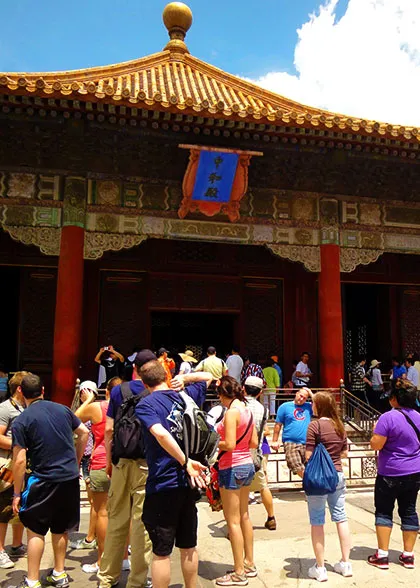 |
| Hall of Central Harmony's Plaque |
The Hall of Central Harmony is located between the Hall of Supreme Harmony (Taihedian) and the Hall of Preserved Harmony (Baohedian). These three, known as the Three Great Halls of the Outer Court, are on the central axis of the Forbidden City. Despite being the smallest of the three, it possesses distinct architectural highlights: its square form and circular roof finial.
Unique Square Palace with a Round Gilded Finial
Covering a total area of 580 square meters (624.28 square yards), the Hall of Central Harmony is a 19-meter-high (62.34 feet) square structure built like a pavilion, each side of which is 24.15 meters (79.23 feet) long.
Towering at about 3.16 (10.4 feet) meters tall with a diameter of 1.5 meters (4.9 feet), this masterpiece ranks among the most intricate and prestigious structures in the Forbidden City. Its circular finial decor, paired with the square hall, creates a harmonious blend of formality and dynamism.
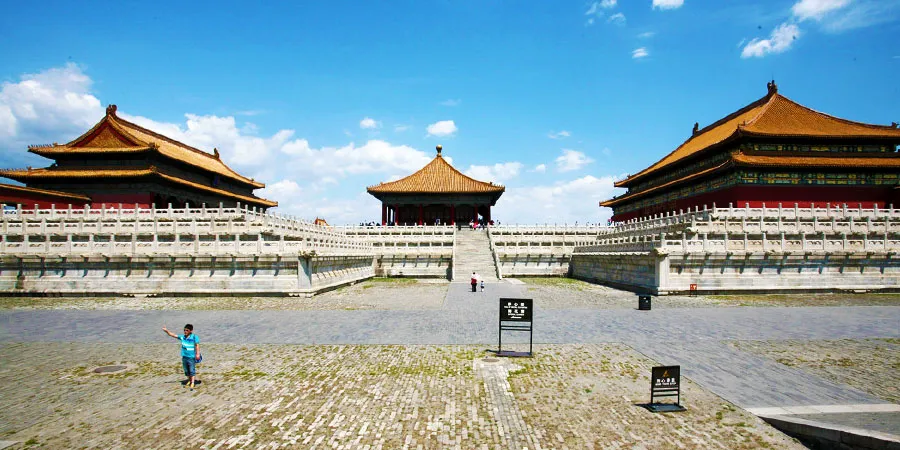 |
| Hall of Central Harmony - the Solely Square and Smallest among the Three Major Halls |
Tale of the Finial: Erlang Temple's Enigmatic Morning Glow
Legend has it that every morning, Erlang Temple in Beijing received an unusual visitor—golden sunlight from the west. People were puzzled because neighboring houses didn't share this experience, leading some to speculate that it was a sign of divine intervention.
The mystery was solved when it was discovered that the gilded copper finial on the roof of the Hall of the Central Harmony reflected sunlight into Erlang Temple, creating this magical phenomenon.
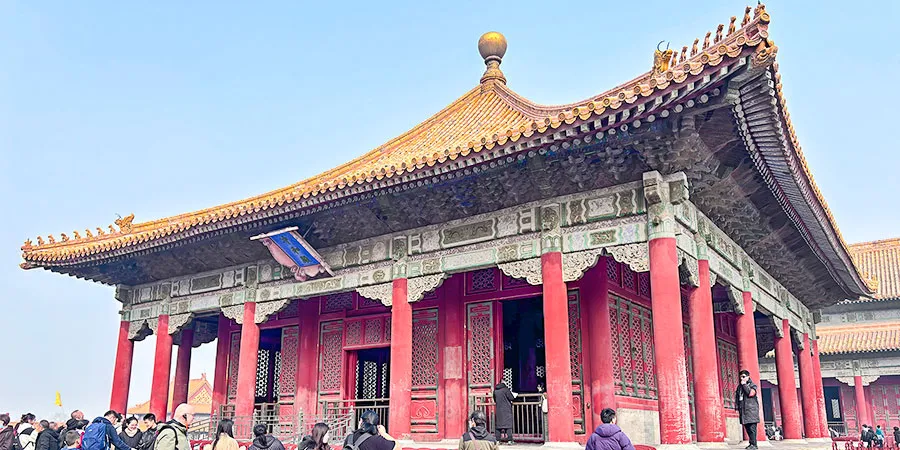 |
Why was it designed the solely square one with a round finial?
Artistic Balance amid Rectangles
The square Hall of Central Harmony breaks the monotony of the other two rectangular halls, adding visual interest. The inclusion of a round gold-plated finial atop softens the straight rooflines beside, enhancing a curvy beauty.
 |
| Soften the Straight Lines on Both Sides with Curves |
Cosmology Rooted in Ancient Beliefs
Designed according to the “round sky and square earth” ancient Chinese cosmology, the Hall of Central Harmony embodied the emperor’s wish of the comprehensive harmony between heaven and earth.
History of the Hall of Central Harmony
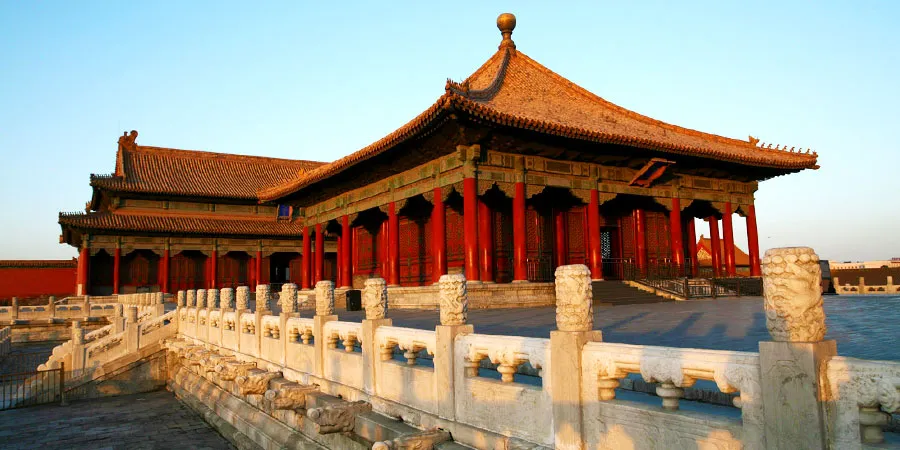 |
Built in 1420, the eighteenth year of the reign of Emperor Yongle (1403-1424), the Hall of Central Harmony was named "Huagaidian" at the beginning of the Ming Dynasty (1368-1644). In the reign of Emperor Jiajing (1522-1566), it was fired and renamed "Zhongjidian" after reconstruction. The ink marks of the three Chinese characters (Zhong Ji Dian) can still be seen.
Having undergone three fires, the present takes on the look of what it was after reconstruction in 1627, the seventh year of Emperor Tianqi (1621-1627) of the Ming Dynasty (1368-1644).
The Qing imperial household came to live in the Forbidden City in the first year of the reign of Emperor Shunzhi (1644-1661), and called it "Zhonghedian" instead of "Zhongjidian" the next year.
What’s the meaning of “zhonghe”?
The two Chinese characters, "zhong" and "he", respectively mean “central/balance” and “harmony” in English. The two characters were combined to imply that each party can be satisfied only if they are treated without any bias, promoting "the golden mean" of Confucius.
What’s the use of the Hall of Central Harmony?
Emperor's Rest & Meeting Venue
The Hall of Central Harmony served as a place for rest for the emperor when he was on his way to hold ceremonies in the Hall of Supreme Harmony. When everything was ready, he would go to the Hall of Supreme Harmony to receive homage. It was here that he consulted with his ministers and officials.
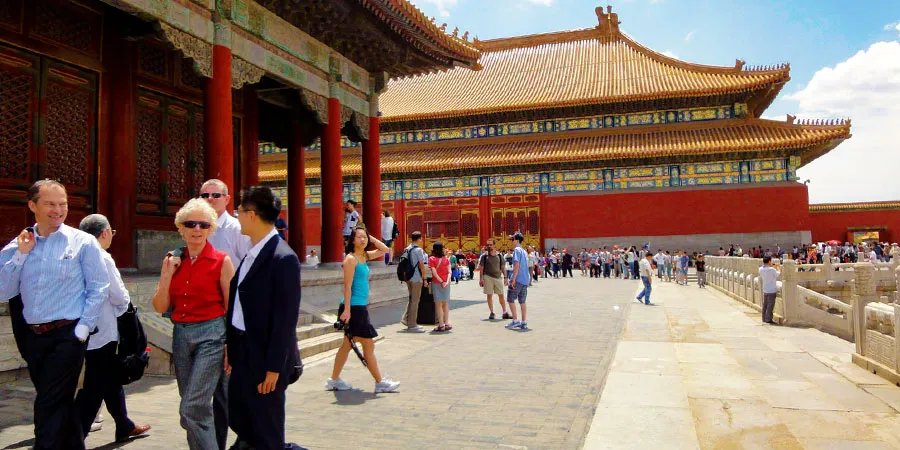 |
| Halls of Central Harmony & Supreme Harmony |
Temporary Office for the Emperor
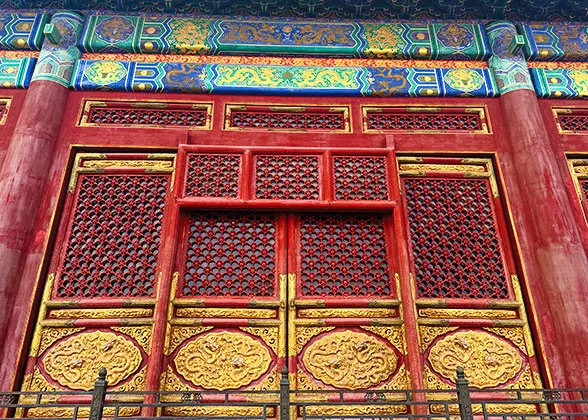 |
| Hall of Central Harmony's Doors |
Each year prior to their departure for important sacrificial rites at the Temple of Heaven, the Temple of the Earth or elsewhere, he would come here to prepare elegiac addresses.
Before going to the Altar of the God of Agriculture (Xiannongtan) to plow land and sew sow seeds himself every spring, the emperor would check the seeds and farming tools used in the ceremony here.
Site of Family Affairs
The imperial family tree of the Qing Dynasty was compiled once every decade. When the compilation was finished, it would be sent to the emperor to be examined, which was also done in it.
What’s inside the Hall of Central Harmony?
Throne
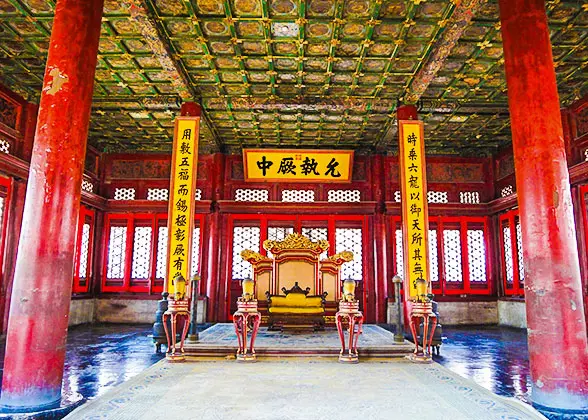 |
Centered in the hall is a 1.9-meter-tall gilded throne crafted from nanmu (precious Chinese timber). Intricate carvings of clouds and dragons decorate its surface, while gems and pearls are embedded in its backrest and armrests. You can imagine the emperor resting or reviewing sacrifice here before proceeding to the Hall of Supreme Harmony for grand celebrations.
"Luduan" Incense Burners
On either side of the throne armrests are sandalwood burners shaped in golden “luduan”, mythical creatures believed to be multilingual and capable of traveling 9,000 kilometers (about 5,600 miles) in a day. They symbolize the emperor’s great wisdom, used when the emperor rested here.
Gilded Copper Incense Burners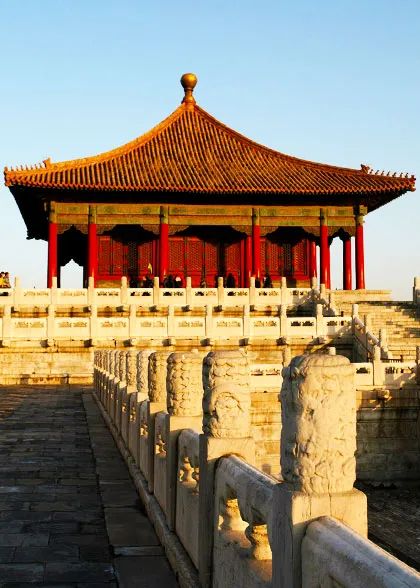
Four round rosewood tables stand in front of the throne, each supporting a gilded copper incense burner. During ceremonies, sandalwood was lit inside, and fragrant smoke emerged from the holes, creating a mystical and pleasant atmosphere.
Bronze Heating Burners
Behind the gilded copper incense burners, on both sides, stand bronze heating burners used to keep warm with charcoal fires.
Emperor's Sedans
Beside the throne, two sedan chairs rest on the floor. These were the primary transportation tools for emperors within the palace. The emperor would ride in a sedan from the Gate of Heavenly Purity to the Hall of Central Harmony.
Go north to visit the Hall of Preserved Harmony (Baohedian).
How to visit the Forbidden City
- Last updated on Aug. 01, 2025 by Gabby Li -